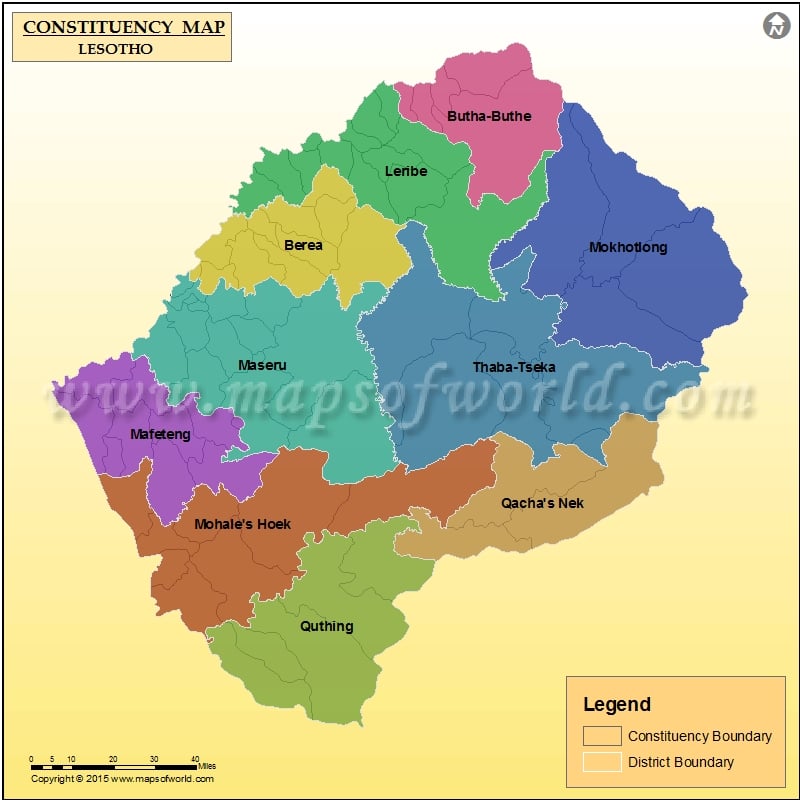Map of Elections in Lesotho 2015

The Kingdom of Lesotho goes to elections on 28th February 2015 to elect the next Prime Minister and members of the Parliament. Lesotho is a landlocked country with an area of 30,355 sq km of land that is surrounded by South Africa and having Maseru as its Capital. The major ethnic group is Basotho which makes for 99.7% of the population, with the rest being a mix of Asians and Whites. The dominant religion is Christianity followed by 80% of the people, with the remaining following traditional African beliefs. The official language is Sesotho (South Sesotho) and English. Phuthi, Zulu and Xhosa are the other languages spoken.
Election History
Lesotho won its independence from the United Kingdom in 1966 and has since seen a mix of political dispensation and rule, accompanied by frequent periods of political instability. From 1966 to 1986, the country saw Basotholand National Party (BNP) led by Chief Jonathan, as the Prime Minister, dominate politics.
Jonathan’s rule was divisive and alienated the Royalty, led by King Moshoeshoe II. Tension between them mounted and the King was placed under house-arrest but was subsequently released against an understanding that he would stay away from politics. Meanwhile, BNP developed close ties with South Africa that was still under Apartheid, much to the resentment of the local people of Lesotho.
The fallout of this was the rise in popularity of the Basutoland Congress Party (BCP). Apprehensive that BNP would lose the elections to BCP, Prime Minister Jonathan declared emergency in January 1970, arresting opposition members and once again placing the King under house arrest. The King went into exile but was permitted to return against an assurance that he would refrain from active politics. Political turmoil continued through most of the period till January 1986, when the Military staged a coup and the Military Council took control. This was again a period of instability and clashes but the military continued to remain in power till 1993.
During this period, BNP had lost much of its support amongst the people, while the BCP grew in popularity. This was demonstrated in the National Assembly elections held in March 1993, which saw BCP secure a majority winning all seats in the National Assembly. BCP, under the leadership of an aging Ntsu Mokhehle, was unable to provide strong leadership and administration, which gave an opportunity to BNP to align itself with an increasingly resentful army. The government was further battered by a collapsing economy that was struggling with rapidly falling foreign remittances, sent by workers working in the gold mines of South Africa. The government continued to struggle from one crises to another until 1996 when a period of relative stability was established with South African intervention.
1998 to 2006 was a period that saw some political reform and democratic process taking shape. The 2002 elections was won by Lesotho Congress for Democracy (LCD). The 2007 elections saw LCD along with its alliance partner, the National Independent Party, win 82 of the 120 seats in the National Assembly. BCP was wiped out winning just one seat, while the once dominant BNP could secure only three. The 2012 National Assembly elections saw the Democratic Congress (DC) emerge as the leading party with 48 seats, followed by All Basotho Convention (ABC) with 30 seats and Lesotho Congress for Democracy (LCD) with 26 seats.
Tom Thabane of ABC is the serving Prime Minister and heads the government with executive authority. Being a Kingdom, Lesotho has a ceremonial Monarchy, where the King is proscribed from active politics. The present King is Letsie III who ascended to the throne in 1996.
The 2015 elections is expected to see a close contest between DC and LCD.
Election System
Lesotho follows a multi-party system. The Parliament comprises of two chambers; the National Assembly and the Senate.
The National Assembly follows a Mixed Member Proportional System, with a total of 120 seats. 80 members are voted in through the first-past-the-post constituency elections, while 40 members come through proportional representation. Each member is voted in for a term of five years.
The Senate has 33 members.
Election Process
The Independent Electoral Commission (IEC) is an independent body appointed by the King, on the advice of the Council of states. IEC is mandated with organizing and supervising free and fair elections.
Constituency candidates for the National Assembly are nominated through a nomination paper which is endorsed by 2 voters in the constituency, along with the mandatory deposit of payment. The Compensatory seats are nominated through the respective party lists. All registered voters are required to present their registration card or proof of identity at the time of voting.
Political Parties
In the 2012 elections, the main political parties in the fray were Democratic Congress (DC), All Basotho Convention (ABC), Lesotho Congress for Democracy (LCD), Basotho National Party (BNP), Popular Front for Democracy (PFD), National Independent Party (NIP), amongst several others.
Political Candidates
Amongst the prominent candidates contesting the polls will be former Prime Minister Pakalitha Mosisili of DC, Thesele Maseribane of BNP, amongst several others from various parties, including Thomas Thabane of ABC, the current Prime Minister. The final list of candidates is yet to be announced by IEC.
In a recent development, the Chairman of IEC, Justice Mahapela Lehohla, has written to the Prime Minister stating that the IEC is not prepared to hold elections in February 2015, as the Voter rolls have not been verified and are suspect. He has requested more time and additional funds to complete the verification process. The problem has been further compounded by the theft of computers at IEC, which held voter data. This controversy has now put a question mark on the election date as also they election integrity.